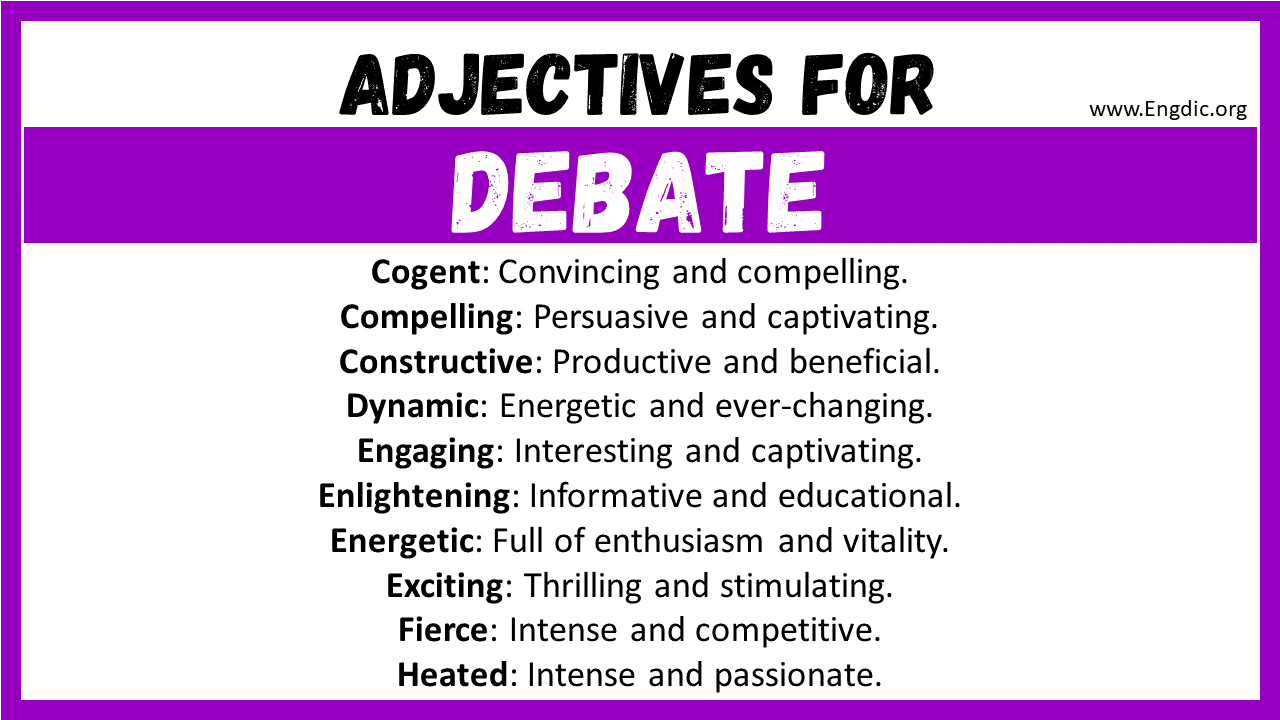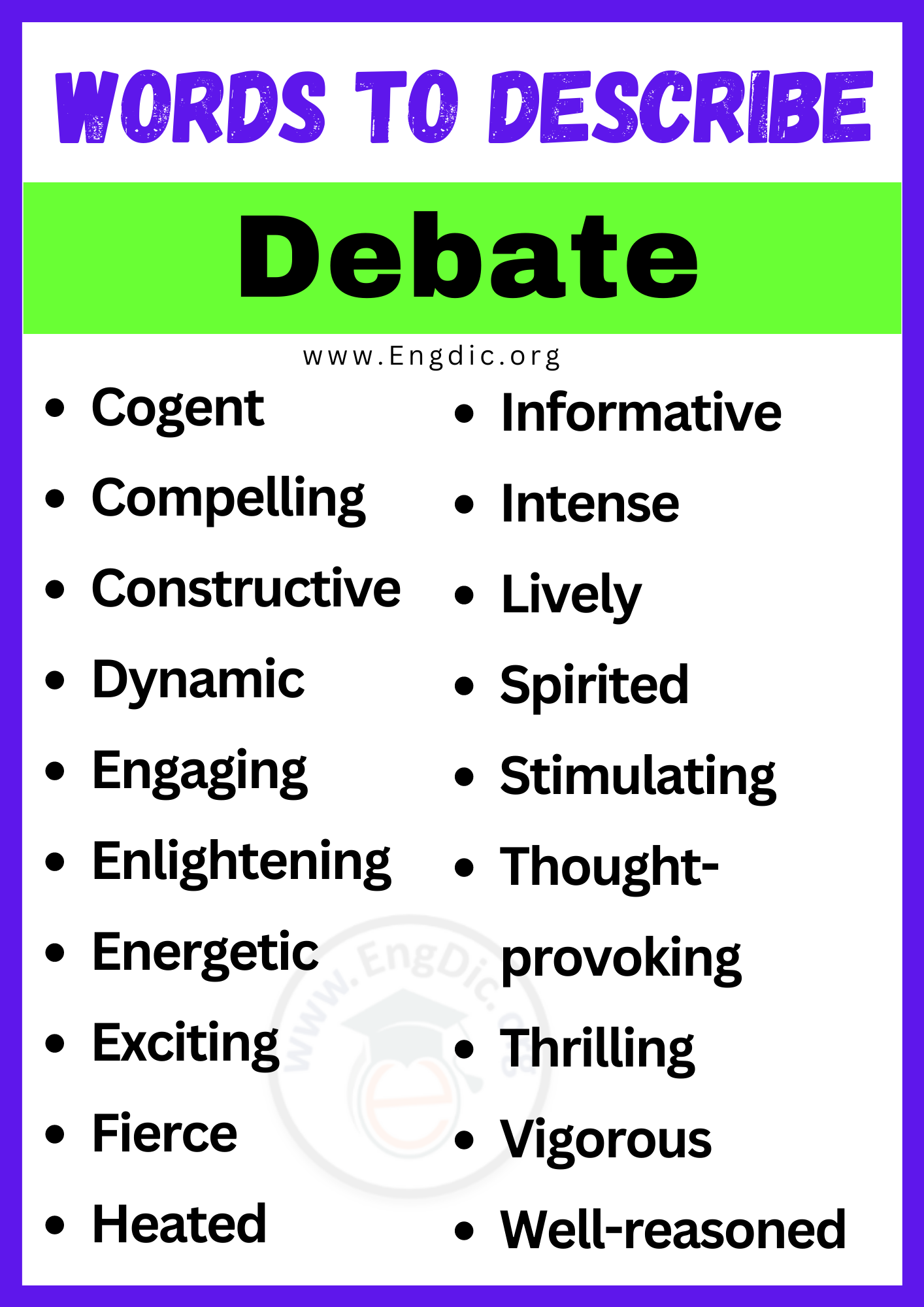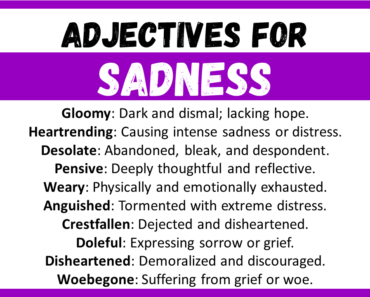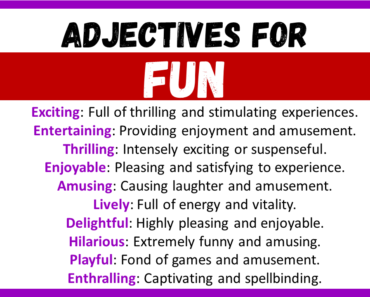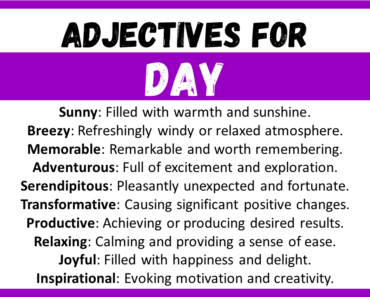Debate, in simple terms, can be described as a formal discussion where people express their viewpoints on a particular topic, presenting arguments and counterarguments. It is a platform for individuals to engage in a constructive exchange of ideas, challenging each other’s perspectives and seeking to persuade others. Words to describe debate include spirited, thought-provoking, engaging, informative, intense, and enlightening. Through the power of words, debates encourage critical thinking, foster understanding, and promote the exploration of diverse viewpoints.
Adjectives for Debate
Here are the 20 Most Popular adjectives for debate:
- Cogent
- Compelling
- Constructive
- Dynamic
- Engaging
- Enlightening
- Energetic
- Exciting
- Fierce
- Heated
- Informative
- Intense
- Lively
- Persuasive
- Spirited
- Stimulating
- Thought-provoking
- Thrilling
- Vigorous
- Well-reasoned
Words to Describe Debate with Meanings
- Cogent: Convincing and compelling.
- Compelling: Persuasive and captivating.
- Constructive: Productive and beneficial.
- Dynamic: Energetic and ever-changing.
- Engaging: Interesting and captivating.
- Enlightening: Informative and educational.
- Energetic: Full of enthusiasm and vitality.
- Exciting: Thrilling and stimulating.
- Fierce: Intense and competitive.
- Heated: Intense and passionate.
- Informative: Educational and enlightening.
- Intense: Powerful and fervent.
- Lively: Energetic and animated.
- Persuasive: Convincing and influential.
- Spirited: Energetic and enthusiastic.
- Stimulating: Inspiring and invigorating.
- Thought-provoking: Inspiring critical thinking.
- Thrilling: Exciting and exhilarating.
- Vigorous: Strong and robust.
- Well-reasoned: Logical and rational.
Example Sentences for Debate Adjectives
- The speaker presented a cogent argument that swayed the audience.
- Her speech was so compelling that everyone was captivated.
- They engaged in a constructive discussion to find common ground.
- The dynamic debate kept the audience on the edge of their seats.
- The panelists delivered an engaging discussion on current issues.
- The documentary provided an enlightening exploration of the topic.
- The team approached the debate with energetic enthusiasm.
- The exciting exchange of ideas sparked a lively debate.
- The candidates engaged in a fierce battle of words.
- The heated debate revealed deeply held beliefs on the topic.
- The lecture was highly informative and expanded our knowledge.
- The intensity in the room grew during the intense debate.
- The lively discussion among experts led to new insights.
- Her persuasive argument convinced everyone to change their minds.
- The spirited debate showcased the passion of the participants.
- The panel discussion was stimulating and sparked intellectual curiosity.
- The thought-provoking debate encouraged critical thinking among the audience.
- The thrilling debate left the audience wanting more.
- The team prepared for the debate with vigorous research.
- The speaker presented a well-reasoned argument supported by evidence.
Explore More Words:
FAQ’s
How to describe the debate in writing?
A debate in writing can be described as a formal exchange of arguments and counterarguments on a specific topic, where individuals present their viewpoints and engage in a structured discussion.
What makes a good debate?
A good debate is characterized by well-prepared participants, respectful discourse, logical reasoning, effective use of evidence, active listening, and the ability to construct persuasive arguments.
How do you start a debate greeting?
In a debate greeting, it is customary to start with a polite and respectful introduction. Begin by acknowledging the audience and fellow debaters, followed by a concise statement of the topic or motion that will be discussed.
